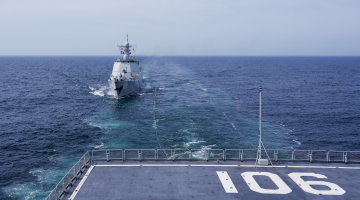By Zhu Xiaoqi
The Japanese cabinet released a new version of the Basic Plan on Ocean Policy recently. As a national policy of Japan's ocean strategy, the plan establishes the development direction of Japan's ocean policy in the next five years. The plan is in line with the three security policy documents including the National Security Strategy (NSS), National Defense Strategy (NDS) and Defense Buildup Program (DBP) released at the end of last year. The plan wantonly exaggerates the so-called external threats facing Japan, emphasizes the need to enhance Japan's defense forces and maritime law enforcement capabilities, and tries to further break through the constraints of the peace constitution. Such behavior goes against the trend of history and will undoubtedly significantly increase regional security risks.
Japan's Basic Plan on Ocean Policy has been promulgated every five years since 2008, and this is the fourth time that the Japanese government has revised this document. Compared with the previous version, the most prominent feature of the new version is that it tries to emphasize the urgency of strengthening defense forces and maritime law enforcement capabilities by exaggerating peripheral security threats. In order to exaggerate that Japan's national interests are facing so-called unprecedented serious threats, the plan slanders the legitimate law enforcement and rights protection actions of China Coast Guard, it even deliberately distorts China's legitimate actions to safeguard national sovereignty in the East China Sea and South China Sea. These extremely absurd remarks reflect the Japanese government's dangerous scheme to expand its military.
First, it seeks to strengthen military power. The plan pointed out that in order to cope with the most severe and complex post-war security environment in Japan's surrounding maritime and air areas, the Ministry of Defense and the Japan Self-Defense Forces (JSDF) are seeking to fundamentally strengthen the defense force. To this end, Japan will comprehensively improve defense force and maritime law enforcement capabilities. On the one hand, Japan promotes the integration of military and police, strengthen the joint training and close coordination between the JSDF and the Japan Coast Guard in response to situations. The plan clearly stipulates that the Minister of Defense has the right to command the Coast Guard in case of an emergency. This approach undoubtedly incorporates Japan Coast Guard into its defense system. On the other hand, Japan seeks to make its fishery management policial. Japan established the Fisheries Enforcement Headquarters under the Ministry of Agriculture, Forestry and Fisheries to strengthen the control of the so-called illegal activities of foreign fishing boats, and equip fishery management boats with bulletproof, knife-proof and squirt gun-proof equipment.
Second, it seeks to improve the intelligence system. The plan highlights the need to strengthen intelligence work, and strengthen maritime surveillance and intelligence gathering by comprehensively utilizing naval vessels, patrol vessels, survey vessels, aircraft, satellites, and coastal radars of the Ministry of Defense, the JSDF, the Coast Guard, and the Cabinet Secretariat within Japan's territorial waters. In particular, the plan requires actively promoting the application of new technologies such as satellites, drones, and unmanned remote-controlled submersibles in alert and surveillance. At the same time, the plan also claims that Japan will jointly create an intelligence collection, analysis and sharing system with so-called like-minded countries.
Third, it advocates camp confrontation. The plan emphasizes that in this era of complex and intertwined confrontation and cooperation, Japan will work with the US and other countries to curb the occurrence of emergencies and unilateral attempts to change the status quo and promote a new balance of power in international relations, especially in the Indo-Pacific region. Specifically, it will strengthen joint training and joint exercises between the Japan Maritime Self-Defense Force (JMSDF) and the navies of other countries, continue to promote the overseas dispatch activities of the JSDF, and strengthen security assurance capabilities and deterrence. At the same time, it will promote the Japan Coast Guard to strengthen its capabilities through multilateral mechanisms such as the Quad among Japan, the US, Australia, and India, and promote cooperation with maritime security agencies of various countries.
As a national policy of Japan's ocean strategy, the plan is in line with the three security policy documents. Instead of focusing on the peaceful use of the ocean and peaceful settlement of disputes, it repeatedly uses words such as rapid changes and profound threats to exaggerate security threats to break through the constraints of the peace constitution and find excuses for increasing defense budget and strengthening the so-called defense forces. The frequent release of national strategic documents filled with plans for military expansion not only deviates from the purpose of Japan's peace constitution but also goes against the will of the Japanese people and will also aggravate regional security risks.
(The author is from the School of International Relations, Renmin University of China.)









